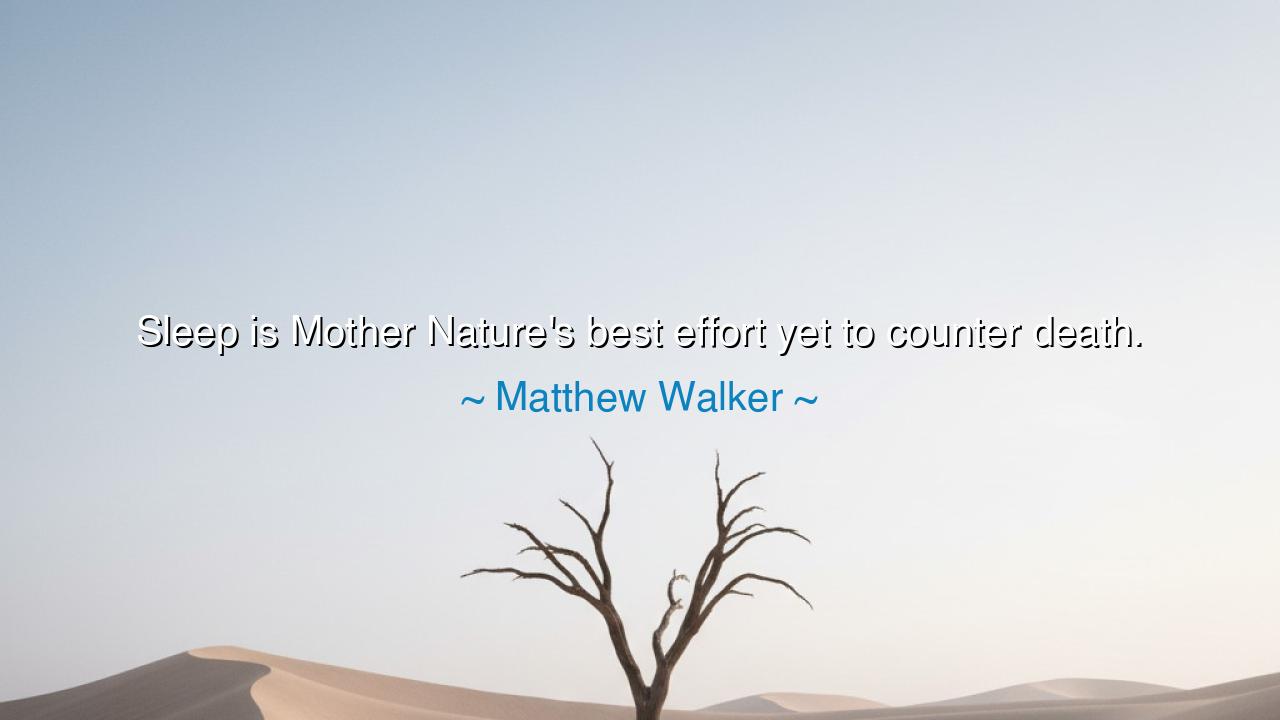
Sleep is Mother Nature's best effort yet to counter death.






When Matthew Walker, the modern sage of slumber, proclaimed that “Sleep is Mother Nature’s best effort yet to counter death,” he spoke not only as a scientist, but as a philosopher gazing into the heart of existence itself. For in those hours when we surrender our waking selves to the stillness of night, something sacred occurs — the body is renewed, the mind is mended, and the soul, weary from its daily struggles, is brought again into harmony with life. In this mysterious rhythm of rest and awakening, sleep stands as the gentle guardian of vitality, a divine rebellion against the creeping hand of decay.
The ancients knew this truth long before the age of medicine or machines. The Greeks spoke of Hypnos, the god of sleep, twin brother of Thanatos, the god of death. They understood that to close one’s eyes each night was to draw near to the edge of eternity — but also to rise again in the morning was to triumph over that shadow. Every dawn, then, is a small resurrection, and every night, a rehearsal for the long rest that awaits us all. Thus, in Walker’s words, sleep becomes not merely a biological necessity, but a spiritual covenant — Mother Nature’s promise that life, though fragile, renews itself again and again.
In this way, the quote reminds us that sleep is not idleness, but a sacred act of restoration. The heart slows, the mind drifts through dream’s quiet chambers, and within us, invisible healers go to work. The body repairs its cells, strengthens its defenses, balances its rhythms. The mind organizes memory, tempers emotion, and rekindles clarity. To deprive oneself of sleep is not a mark of strength, but of arrogance — a rebellion against the very design of life. For those who chase the night in ceaseless toil, death draws nearer with every sleepless hour. Yet those who rest in rhythm with nature, who honor the cycle of light and dark, find in sleep a quiet immortality, the whisper of eternity renewing itself.
Consider the story of Thomas Edison, the tireless inventor who boasted that he slept only four hours each night. He conquered darkness with his lightbulb but fell prey to the very arrogance of denying darkness its purpose. In his later years, he suffered exhaustion and frailty — his body strained by decades of stolen rest. In contrast stood Albert Einstein, who slept long and often, calling his dreams “the cradle of thought.” In his surrender to rest, he found inspiration and vitality. Here lies a lesson written not in myth, but in flesh: to embrace sleep is to embrace life itself.
The origin of Walker’s insight lies in the union of modern science and ancient wisdom. Through his study of the brain, he has unveiled what the old mystics already knew — that sleep is the bridge between the mortal and the eternal, between the body and the soul. It is nature’s alchemy, turning fatigue into strength, confusion into clarity, and despair into peace. In an age that glorifies sleepless ambition, his words remind us that even the gods themselves rested after creation. For without rest, creation itself withers.
There is also a deep metaphor within this truth. Just as the body must sleep to live, so too must the spirit learn to rest — to trust, to release, to be still. The world is filled with noise, desire, and endless striving. But in the silence of sleep, we remember that we are part of something vast and timeless. We are not machines of labor; we are living beings woven into the rhythm of stars and tides. Mother Nature, in her infinite wisdom, has granted us this nightly resurrection as both mercy and reminder: that every end is but a pause before renewal.
Therefore, let this be your lesson: Do not wage war against rest. Guard your sleep as you would guard your life, for they are one and the same. When night falls, lay down your burdens, let the mind quiet, and trust that nature will do her healing work. Rise each morning as though newly born, for in truth, you are. Drink deeply of rest, and you shall drink deeply of life. For in her tender genius, Mother Nature has made of sleep her greatest triumph — the soft shield between man and death, the quiet miracle by which we live again each dawn.






AAdministratorAdministrator
Welcome, honored guests. Please leave a comment, we will respond soon